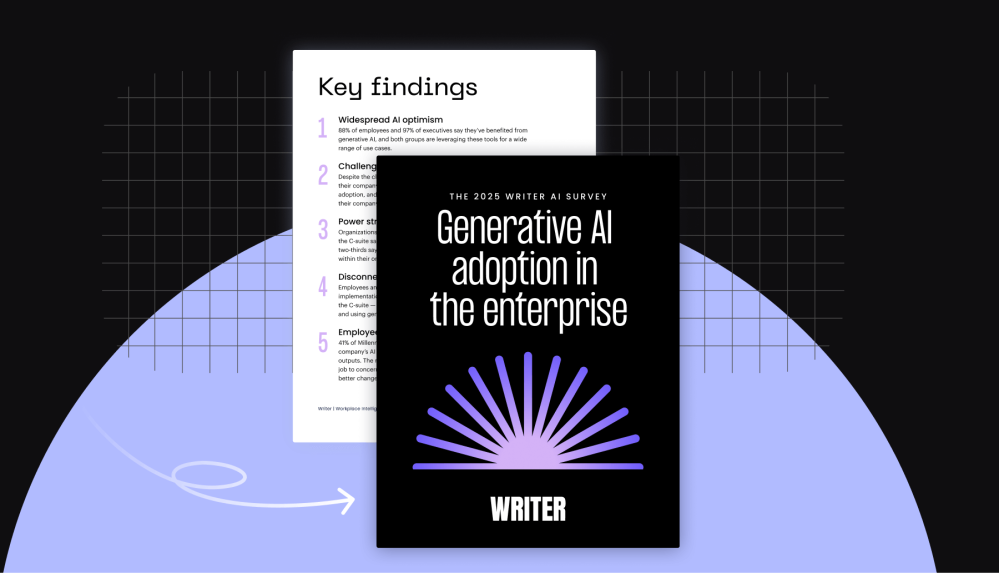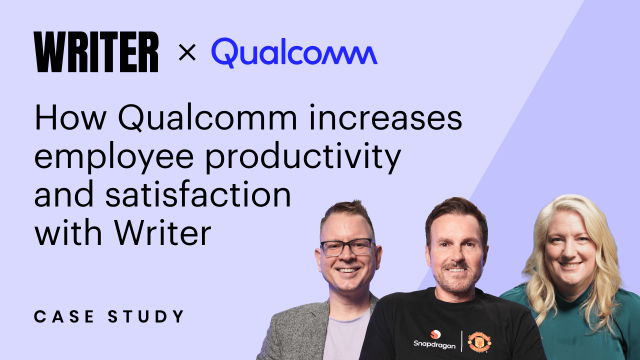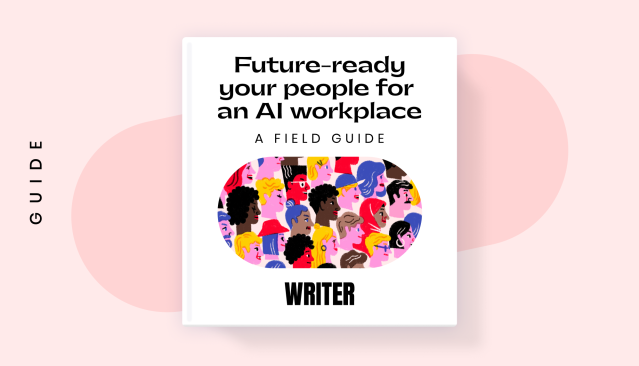Inside WRITER
– 6 min read
68% of C-suite say AI adoption has caused division at their company, reveals WRITER AI report

WRITER/Workplace Intelligence survey of 1,600 US executives and knowledge workers finds AI has created power struggles between IT and other lines of business as well as between executives and employees
March 18, 2025, SAN FRANCISCO, CA — WRITER, the leading generative AI platform for the enterprise, today announced the release of its 2025 AI Survey: Generative AI adoption in the enterprise. The study, conducted in partnership with independent research firm Workplace Intelligence, provides a unique lens into the experiences of knowledge workers and C-suite executives actively using AI in the workplace.
The report examines the obstacles leaders are facing as they implement generative AI within their organizations, including internal power struggles, poor ROI, underperforming tools, and clashing perspectives among executives and employees. In fact, 72% of the C-suite say their company has faced at least one challenge on their journey to generative AI adoption.
Despite these challenges, the vast majority of workers and executives actively using AI say they’ve benefited from generative AI tools, and at least 9 out of 10 are optimistic about their company’s approach to generative AI. Additionally, among employees using AI, 77% are AI champions or have the potential to become AI champions. With this in mind, the survey also explored strategies to strengthen the AI adoption process, which 95% of the C-suite admit their company needs to improve.
Key findings around AI adoption obstacles:
- Power struggles and poor internal alignment: Around 2 out of 3 executives say generative AI adoption has led to tension and division within their company, and 42% say this is tearing their company apart. More than 1 out of 3 executives say generative AI adoption has been a massive disappointment.
- Friction between IT and business leaders: Two-thirds of the C-suite say there has been tension between IT teams and other lines of business, and 71% of the C-suite admit AI applications are being created in a silo within their organization.
- Lack of ROI and poor-quality tools: 73% of companies are investing at least $1 million each year in generative AI technology, but only around one third have seen significant ROI. Meanwhile, over a third of employees (35%) are paying out-of-pocket for the generative AI tools they use because their employer doesn’t provide the tools they want.
- Employee retaliation: For reasons ranging from fears about AI to concerns about the quality of AI tools, 31% of employees — including 41% of Gen Z — admit they’re sabotaging their company’s AI strategy, for example by refusing to use AI tools or outputs.
Key findings around improving AI adoption:
- Higher investment results in better ROI: When it comes to successfully adopting generative AI, there’s a 40 percentage-point gap between companies who invest the most and those who invest the least.
- Activating AI champions is key: Among employees using AI, 77% are either AI champions or have the potential to become AI champions. These workers have embraced AI and can add immense value by helping develop AI solutions. In fact, nearly all (98%) AI champions have either already helped build AI tools for their company or would like to do so, and 94% have seen a career benefit.
- An organization-wide strategy wins: Putting a clear organization-wide approach in place is the number one driver of successfully adopting and implementing AI. At companies that do not have a formal AI strategy, just 37% of executives say they’ve been very successful at adopting and implementing AI, versus 80% at companies that do have a strategy.
- Selecting the right AI vendor is critical: 98% of the C-suite feel vendors should help shape the vision for AI at work. Yet 94% report that they’re not completely satisfied with the vendors they use, noting a variety of ways in which vendors could be providing more support.
“The future belongs to the enterprises that can turn AI enthusiasm into business reinvention,” said May Habib, CEO & Co-Founder, WRITER. “Generative AI holds transformative potential, but it’s also creating deep rifts within companies that are relying on a patchwork of point solutions or developing internal apps in a silo. At WRITER, we’re ensuring AI is a catalyst for growth, not a source of conflict, by uniting IT teams, business leaders, and champions in a single collaborative AI platform and providing a strategic roadmap for success.”
“The companies who will lead in the next era of AI adoption are the ones putting the right processes and systems in place today,” said Dan Schawbel, Managing Partner, Workplace Intelligence. “They’re prioritizing their change management efforts, cultivating support for AI among their people, and ensuring they’re making the right investment in AI tools. Above all, they’re carefully assessing AI vendors, recognizing that the right vendor is key to unlocking the full potential of AI within their business.”
“AI transformation is ultimately about people,” said Alexis McBride, Vice President of Customer Success, WRITER. “Over four years helping hundreds of the world’s leading enterprises scale AI, we have developed a blueprint for adoption that starts by uniting organizations around a common vision. This focus on human-centered solutions delivers dramatically stronger ROI, with employees who use WRITER at work twice as likely to champion AI initiatives.”
To view the full findings, download WRITER’s generative AI adoption in the enterprise report.
Learn more about WRITER’s full-stack generative AI platform for the enterprise at writer.com.
Methodology:
Research findings are based on a survey conducted between November 29 to December 24, 2024. The survey included 1,600 knowledge workers across the U.S., including 800 C-suite executives and 800 employees. Employees were required to be using generative AI tools at work, and executives were required to be working at a company that permits the use of these tools.
About WRITER:
WRITER is the full-stack generative AI platform delivering transformative ROI for the world’s leading enterprises. Its fully integrated solution makes it easy to deploy secure and reliable AI applications and agents that solve mission-critical business challenges. WRITER’s suite of development tools is supported by Palmyra – WRITER’s state-of-the-art family of LLMs – alongside its industry-leading graph-based RAG and customizable AI guardrails. Hundreds of customers like Accenture, Intuit, Salesforce, Uber, and Vanguard trust WRITER to transform the way they work. Founded in 2020 with offices in San Francisco, New York City, and London, WRITER is backed by world-leading investors, including Premji Invest, Radical Ventures, ICONIQ Growth, Insight Partners, Balderton, B Capital, Salesforce Ventures, Adobe Ventures, Citi Ventures, IBM Ventures, WndrCo, and others. Learn more at writer.com.
About Workplace Intelligence:
Workplace Intelligence is an award-winning thought leadership and research agency focused on the world of work. We help companies, and their executives, tell their workplace story in a meaningful, relevant, and impactful way using primary data, insights, and interviews. For more information go to our website and subscribe to our Insider newsletter.
Media Contact:
press@writer.com



